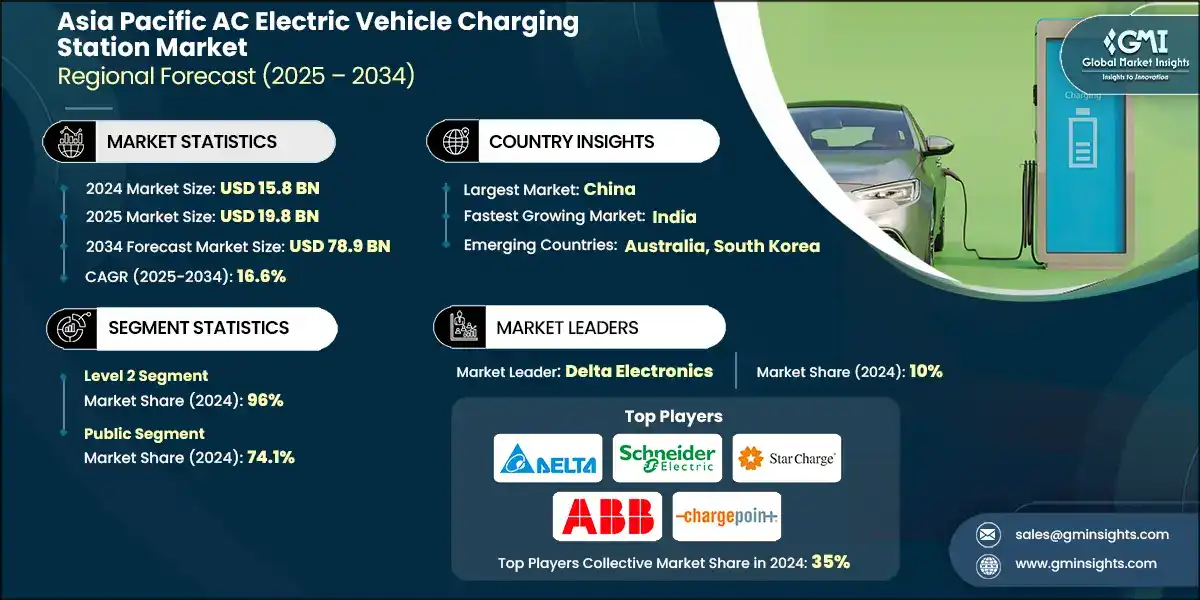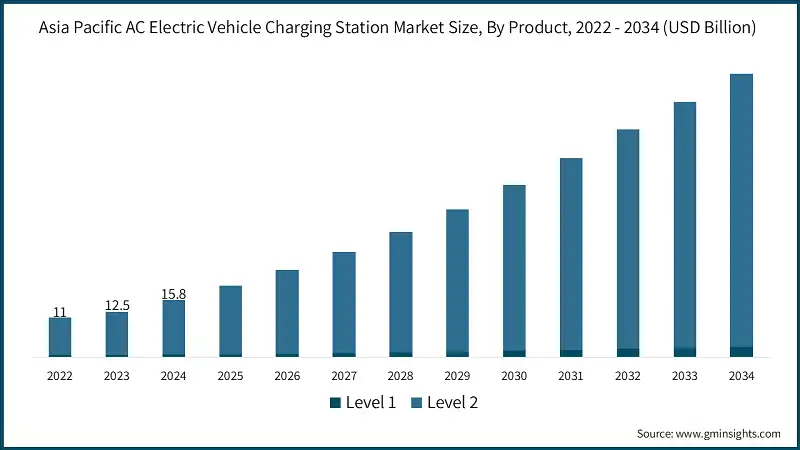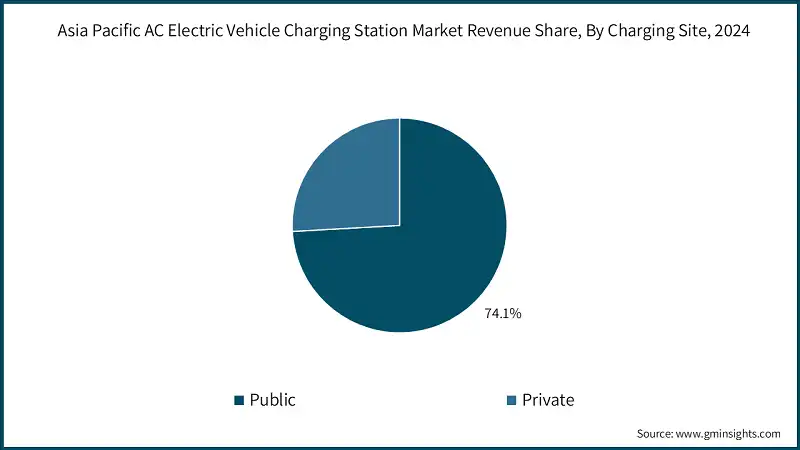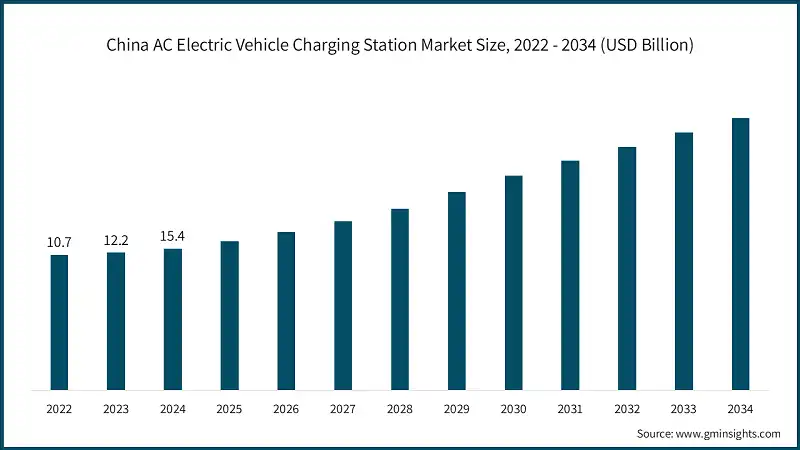Summary
Table of Content

Asia Pacific AC Electric Vehicle Charging Station Market
Get a free sample of this report
Form submitted successfully!
Error submitting form. Please try again.
Thank you!
Your inquiry has been received. Our team will reach out to you with the required details via email. To ensure that you don't miss their response, kindly remember to check your spam folder as well!

Request Sectional Data
Thank you!
Your inquiry has been received. Our team will reach out to you with the required details via email. To ensure that you don't miss their response, kindly remember to check your spam folder as well!
Form submitted successfully!
Error submitting form. Please try again.
Asia Pacific AC Electric Vehicle Charging Station Market Size
The Asia Pacific AC electric vehicle charging station market was estimated at USD 15.8 billion in 2024. The market is expected to grow from USD 19.8 billion in 2025 to USD 78.9 billion in 2034, at a CAGR of 16.6%, according to Global Market Insights Inc.

To get key market trends
- Favorable government policies benefitting AC charging station coupled with public charging infrastructure expansion across various countries in the region are fueling industry growth. Governments across the region are implementing policies to promote electric vehicle (EV) adoption, which in turn will augment the installation of associated charging infrastructure, thereby adding to market growth.
- For instance, Indonesia's Ministry of Energy and Mineral Resources issued Regulation No. 1/2023 on battery electric vehicle charging infrastructure development, aiming to expand EV charging networks. Additionally, the Ministry of Finance Regulation No. 38/2023 lowered the value-added tax on new passenger electric vehicles from 11% to 1%, making EVs more affordable for consumers.
- Increasing private & public investments along with rising technological advancements in the efficiency of AC charging station is further adding to the business dynamics. For instance, AMPPAL, a China based electric car charger manufacturer has been working with the government of China to deploy charging stations along small towns and highways.
- These partnerships leverage private capital and expertise to accelerate the development of charging networks, ensuring widespread access for EV users. In addition, the development of fast level 2 AC chargers capable of delivering high power outputs and reducing charging time is further addressing one of the critical aspects of the EV user.
- Increasing consumer awareness about the benefits of EVs and available charging options along with their integration with renewable energy sources is encouraging sustainability. Governments and organizations are conducting campaigns to educate the public about the environmental and economic advantages of EVs. These efforts help consumers make informed decisions and encourage the transition to electric mobility.
- For instance, in August 2025, JSW MG Motor India rolled out its latest initiative, ‘EV Sahi Hai,’ a nationwide campaign aimed at promoting electric vehicle (EV) adoption by tackling misconceptions and building consumer confidence. The campaign underlines the economic, environmental, and experiential benefits of owning an EV in India, which in turn will have a positive impact on industry growth.
- Integration with renewable energy sources is pushing charging station to get power from solar energy, thereby reducing the carbon footprint of electric vehicles in the region. This integration supports the national goals of increasing the share of renewable energy in the power mix and promotes green transportation solutions.
- For instance, in February 2025, the China National Energy Administration (NEA) announced that the country in 2024 had added around 373 gigawatts of renewable energy capacity, a 23% year-on-year increase compared to 2023. The solar dominated renewable energy sector will eventually add to the growth of charging stations industry across the country that powers the EVs with renewable energy.
Asia Pacific AC Electric Vehicle Charging Station Market Report Attributes
| Key Takeaway | Details |
|---|---|
| Market Size & Growth | |
| Base Year | 2024 |
| Market Size in 2024 | USD 15.8 Billion |
| Market Size in 2025 | USD 19.8 Billion |
| Forecast Period 2025 - 2034 CAGR | 16.6% |
| Market Size in 2034 | USD 78.9 Billion |
| Key Market Trends | |
| Drivers | Impact |
| Increasing demand for electric vehicle | Surging consumer interest, supportive policies, and sustainability goals are driving unprecedented demand for electric vehicles across global and regional markets. |
| Rising EV infrastructure investment | Governments and private players are ramping up investments in EV infrastructure, especially AC charging stations, to meet growing adoption and ensure seamless mobility. |
| Pitfalls & Challenges | Impact |
| High installation cost | The upfront expense of deploying AC EV charging stations including hardware, grid upgrades, and civil works remains a key barrier to widespread adoption. |
| Opportunities: | Impact |
| Urban Electrification Push | Rapid urbanization across Asia Pacific is driving demand for decentralized AC charging stations, creating opportunities for scalable, grid-integrated solutions in residential and commercial zones. |
| Policy-Driven Market Expansion | Government incentives, EV mandates, and infrastructure subsidies across countries like China, India, and South Korea are accelerating AC charger deployment. |
| Market Leaders (2024) | |
| Market Leaders |
10% market share |
| Top Players |
Collective market share in 2024 is 35% |
| Competitive Edge |
|
| Regional Insights | |
| Largest Market | China |
| Fastest Growing Market | India |
| Emerging Countries | Australia, South Korea |
| Future outlook |
|
What are the growth opportunities in this market?
Asia Pacific AC Electric Vehicle Charging Station Market Trends
- Exponential & continuous uptick in EV sales along with regulatory reforms supporting residential charging is swaying the industry dynamics across the region. For instance, as per the IEA Global EV Outlook 2025, Vietnam reported EV sales of 69,000 in 2024, a staggering 115% jump from 32,000 in 2023, depicting high EV sales growth across the region.
- In addition, Singapore amended the Building Maintenance and Strata Management Act in December 2023 to lower the threshold for installing EV chargers in strata-titled developments. This legal simplification enables faster deployment of AC chargers in condominiums and private residences, where slow charging is preferred. The move reflects a strategic alignment of policy with infrastructure needs.
- As EV penetration increases, the demand for AC charging stations, especially in residential and commercial zones, will become critical. As a result, various National transport authorities in these countries are actively tracking and supporting this transition, which in turn will have a positive impact on the industry growth down the line.
- Rapid urbanization in Asia-Pacific cities is increasing the demand for sustainable mobility solutions. As urban populations grow, the need for efficient and eco-friendly transportation options becomes more pressing. EVs, supported by accessible charging infrastructure, offer a viable solution to urban transportation challenges.
- In addition, governments are focusing on the electrification of commercial vehicles to reduce emissions and improve air quality. In countries like Japan, incentives are provided for businesses to adopt electric trucks and buses, accompanied by the development of dedicated charging infrastructure. This support facilitates the transition of the commercial transport sector to electric mobility.
- National policies aligning EV adoption with climate goals are driving infrastructure development. For instance, India's commitment to achieving 30% EV market share by 2030 is supported by the PM E-DRIVE scheme, which aims to accelerate the growth of EV sales and charging infrastructure. Such policy alignment ensures a coordinated approach towards sustainable transportation.
- Governments are focusing on the electrification of commercial vehicles to reduce emissions and improve air quality. In countries like Japan, incentives are provided for businesses to adopt electric trucks and buses, accompanied by the development of dedicated charging infrastructure. This support facilitates the transition of the commercial transport sector to electric mobility.
- For instance, in September 2025, Toyota Motor Corporation began the sales of the e-Palette BEV, which can be used for various mobility services including shuttle buses. The vehicle will be used for transportation services and as a mobile store for various goods, among other initiatives.
Asia Pacific AC Electric Vehicle Charging Station Market Analysis

Learn more about the key segments shaping this market
- Based on product, the industry is segmented into level 1 & level 2. The level 2 AC EV charging stations dominated the market accounting for a 96% share in 2024 and is expected to grow at a CAGR of over 16% through 2034. Persistent EV growth across countries including China, India, Vietnam, among others along with increasing workplace EV charging demand is augmenting level 2 EV charging.
- For instance, as per the IEA various countries including China & South Korea, maintains a favorable EV-to-charger ratio, with fewer than 10 EVs per public charger. This balance is achieved through strategic deployment of Level 2 chargers, which offer sufficient power for daily use while remaining cost-effective, thereby adding to the product adoption.
- Furthermore, rapid adoption of electric vehicles, especially BEVs, along with favorable private & public investments augmenting the EV infrastructure is fueling the product adoption across the region. For instance, in August 2025, the China National Development and Reform Commission stated that the country had established world's largest electric vehicle (EV) charging network during the 14th Five-Year Plan period (2021-2025).
- Level 1 AC EV charging stations will grow at a CAGR of 15.9% till 2034, driven by residential charging expansion and favorable policy support for community charging across various countries in the region. The government is actively promoting community-based installations, especially in rural and suburban areas, where Level 1 infrastructure is more cost-effective and easier to deploy.
- Furthermore, Singapore amended the Building Maintenance and Strata Management Act in December 2023, lowering the voting threshold for installing EV chargers in condominiums. This legal reform facilitates the deployment of Level 1 chargers in private residences, where slow charging is preferred. The move reflects a strategic alignment of housing policy with EV infrastructure needs, encouraging broader adoption of Level 1 charging.

Learn more about the key segments shaping this market
- Based on charging site, the industry is segmented into public & private. The public charging site catered to a 74.1% market share in 2024 and will grow at a 17% CAGR through 2034. Favorable government incentives & investments along with national electrification targets & infrastructure planning across countries will complement the business scenarios.
- For instance, in January 2025, the government of South Korea decided to invest over USD 14 billion in 2025 to augment its domestic eco-friendly vehicle and battery industries and boost their competitiveness. This in turn will increase public based EV charging site, in turn adding to the industry growth.
- Furthermore, Indonesia plans to install 6,318 public EV charging stations by 2025, led by the state-owned utility PLN. This initiative is part of a broader USD 1 billion investment in EV infrastructure, aligned with the country’s net-zero goals. Public AC stations are being prioritized in metropolitan areas and along major transport corridors, ensuring widespread accessibility.
- Asia Pacific nations are increasingly powering public AC charging stations with solar and wind energy. This shift not only enhances sustainability but also reduces operational costs, making public AC stations more viable for long-term deployment, in turn adding to the industry dynamics.
- The private AC charging site industry will reach USD 16 billion by 2034, driven by regulatory mandates for private parking spaces and corporate electrification of fleets & facilities. As a result, Governments in Asia Pacific are increasingly mandating EV charging provisions in private parking lots.
- In addition, Taiwan’s Ministry of Transportation and Communications now requires private lots to allocate at least 1% of their total spaces for EV charging. This regulation, part of Taiwan’s zero-emission vehicle roadmap for 2040, is pushing commercial developers and residential complexes to integrate AC chargers into their infrastructure, thereby accelerating private station deployment.
- Innovative business models including subscription-based and pay-per-use AC charging are gaining traction in Asia. Companies like Evcstar are enabling residential and workplace charging through smart chargers that optimize energy use and reduce costs. These models lower the barrier to entry for private users and small businesses, making AC charging more accessible and scalable across urban and semi-urban areas.
- Furthermore, private enterprises across Indonesia are transitioning their operational fleets to electric vehicles. This shift is driving demand for AC charging stations at corporate campuses, logistics hubs, and private depots. The Indonesian government’s support through tax incentives and infrastructure partnerships further encourages private sector investment in charging solutions.

Looking for region specific data?
- China dominated the Asia Pacific AC electric vehicle charging station market with around 97% share in 2024 and generated USD 15.4 billion in revenue. The country’s active push towards expansion of charging infrastructure along with rising integration with smart grid & renewable energy is propelling the market growth across the country.
- For instance, in June 2025, the National Development and Reform Commission (NRDC) in China has attributed the adoption of NEV market & plans further expansion of EV charging infrastructure in rural and highway areas. This is further propelled by its active integration of EV charging with smart grid systems. The 2025 directive promotes intelligent load management and encourages the use of solar and storage systems at charging stations.
- Furthermore, the charging stations in China are evolving into multi-service hubs. The government supports models combining charging with retail, dining, and entertainment. This enhances user experience and boosts utilization rates. Operators are incentivized to maintain 98% uptime and adopt smart monitoring platforms for operational excellence.
- India AC EV charging station industry will reach USD 1.9 billion by 2034. The market is driven by active & favorable government and state policies along with private sector participation and innovation, augmenting the charging station setup across the country.
- For instance, the Department of Heavy Industry sanctioned 4,180 charging stations under FAME II, including 2,636 in cities and 1,544 on highways. This government-backed initiative ensures widespread availability of AC chargers, especially in Tier-2 and Tier-3 cities, supporting equitable EV adoption.
- In addition, companies including Tata Power and ChargeZone are expanding AC charging networks using innovative models like Battery-as-a-Service and subscription-based charging. These models reduce upfront costs for users and improve station utilization, making AC charging more accessible and scalable in India.
- Japan industry will grow at a rate of 11.1% till 2034, driven by strict government targets along with rising focus on residential & destination charging. The government has targeted 300,000 chargers by 2030 with METI to double its EV charging infrastructure target to 300,000 units by 2030, including 30,000 public rapid chargers.
- Furthermore, AC chargers are being installed in rental apartments and commercial destinations like hotels and shopping centers. Japan METI’s 2025 guidelines emphasize user convenience and aim to reduce charging anxiety by ensuring availability at frequently visited places, which will have a positive impact on the market growth down the line.
- The Australia AC EV charging station industry will grow at a CAGR of 17% through 2034, owing to increasing emphasis on adoption of battery electric vehicles (BEVs). For instance, as of June 2025, as per the Electric Vehicle Council (EVC), more than 14,000 additional battery electric vehicles (BEVs) and plug-in hybrid electric vehicles (PHEVs) have been sold in Australia in 2025 relative to the same period in 2024.
Asia Pacific AC Electric Vehicle Charging Station Market Share
- The top 5 companies in the Asia Pacific AC electric vehicle charging station industry are Delta Electronics, Schneider Electric, Star Charge, ABB, and ChargePoint, Inc., contribute around 35% of the market share in 2024. Delta Electronics has a strong footprint across Asia Pacific, particularly in Southeast Asia and Australia, where its chargers are integrated with smart grid systems, thereby catering for a major market share across the region.
- Star Charge is a China-based EV charging manufacturer and infrastructure operator, known for its extensive deployment of AC chargers across urban and semi-urban areas. The company offers wall-mounted and pedestal AC chargers with smart connectivity and energy optimization features. The company has formed strategic alliances with global players including Schneider Electric, as a result caters to a major share in China.
Asia Pacific AC Electric Vehicle Charging Station Market Companies
Major players operating in the Asia Pacific AC electric vehicle charging station industry are:
- ABB
- Blink Charging Co.
- ChargePoint, Inc.
- Delta Electronics
- Eaton
- Efacec
- Elli
- Enphase Energy
- EVBox
- EVSE Australia Pty Ltd.
- Exicom
- Leviton Industries
- LG Electronics Inc.
- Schneider Electric
- Siemens
- SIGNET EV
- Starcharge
- Vinfast
- Volta Industries Inc.
- Webasto Group
- TELD
- Delta Electronics, headquartered in Taiwan, is one of the major providers of energy-efficient power and thermal management solutions. In the AC EV charging domain, the company offers a comprehensive range of Level 2 chargers tailored for residential, commercial, and fleet applications. The company reported USD 1.5 billion in revenue for the month of August 2025.
- Schneider Electric, a French multinational with deep operations in Asia Pacific, is a major player in the AC EV charging space through its EcoStruxure platform. The company provides smart AC chargers for homes, buildings, and public infrastructure, emphasizing energy management and digital integration. In Q1 2025 alone, Schneider reported over USD 9.3 billion in global revenue.
- ABB, headquartered in Switzerland, is a global leader in electrification and automation, with a significant presence in Asia Pacific. Its AC EV charging portfolio includes wall boxes and modular chargers for residential and commercial use. chargers are widely adopted in smart city projects and fleet electrification programs across India, China, and Southeast Asia.
Asia Pacific AC Electric Vehicle Charging Station Industry News
- In July 2025, the government of Japan and India came into a strategic partnership where Japan will invest over USD 100 million in India’s electric vehicle (EV), battery manufacturing, and recycling industries. The investment represents Tokyo's broader strategic effort to reduce China's control over global lithium-ion battery supply chains, critical mineral extraction, and rare earth magnet production.
- In June 2025, Leviton Industries announced the launch of the EV Series Pro Dual Port Level 2 Chargers. The product is designed to meet the growing demand for efficient, reliable and user-friendly EV charging solutions for fleet, MDU (Multi-Dwelling Unit), commercial or public use applications.
- In May 2025, Mahindra & Mahindra has pledged an investment of about USD 1.4 billion over the next three years in India to strengthen its electric vehicle arm, Mahindra Electric Automobile Ltd. This major investment reflects the company’s strong push toward a cleaner, greener future in mobility.
The Asia Pacific AC electric vehicle charging station market research report includes in-depth coverage of the industry with estimates & forecast in terms of revenue (USD Million) and volume (Units) from 2025 to 2034, for the following segments:
Market, By Product
- Level 1
- Level 2
Market, By Charging Site
- Public
- Private
The above information has been provided for the following countries:
- China
- India
- Japan
- South Korea
- Australia
Frequently Asked Question(FAQ) :
Who are the key players in the Asia Pacific AC electric vehicle charging station market?
Key players include Delta Electronics, Schneider Electric, Star Charge, ABB, ChargePoint Inc., Blink Charging Co., Eaton, Efacec, EVBox, Exicom, LG Electronics Inc., Siemens, and others, with the top 5 companies holding 35% collective market share.
What is the growth outlook for private AC charging sites from 2025 to 2034?
The private AC charging site industry will reach USD 16 billion by 2034, fueled by regulatory mandates for private parking spaces and corporate fleet electrification initiatives.
Which country leads the Asia Pacific AC electric vehicle charging station market?
China dominated with approximately 97% market share in 2024, generating USD 15.4 billion in revenue due to active infrastructure expansion and smart grid integration initiatives.
What are the upcoming trends in the Asia Pacific AC electric vehicle charging station market?
Key trends include integration with renewable energy sources, smart grid connectivity, multi-service charging hubs, and innovative business models like Battery-as-a-Service and subscription-based charging solutions.
What was the market share of public charging sites in 2024?
Public charging sites held 74.1% market share in 2024, supported by favorable government incentives, investments, and national electrification targets across Asia Pacific countries.
What is the current Asia Pacific AC electric vehicle charging station market size in 2025?
The market size is projected to reach USD 19.8 billion in 2025.
How much market share did the Level 2 AC charging stations segment hold in 2024?
Level 2 AC charging stations dominated the market with 96% share in 2024, supported by persistent EV growth and increasing workplace charging demand across countries like China, India, and Vietnam.
What is the market size of the Asia Pacific AC electric vehicle charging station in 2024?
The market size was USD 15.8 billion in 2024, with a CAGR of 16.6% expected through 2034 driven by favorable government policies, expanding EV adoption, and infrastructure investments across the region.
What is the projected value of the Asia Pacific AC electric vehicle charging station market by 2034?
The Asia Pacific AC electric vehicle charging station market is expected to reach USD 78.9 billion by 2034, propelled by national electrification targets, renewable energy integration, and rapid urbanization.
Asia Pacific AC Electric Vehicle Charging Station Market Scope
Related Reports


